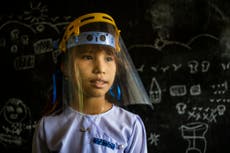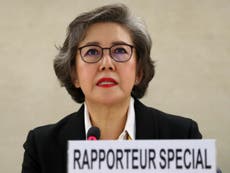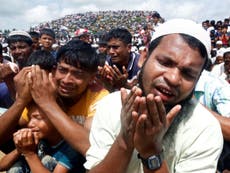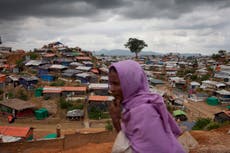Myanmar is setting the stage for sham elections – the international community cannot just stand by
The Rohingya desperately want to see a genuine democracy take root. But democracy is not what’s on offer
Your support helps us to tell the story
From reproductive rights to climate change to Big Tech, The Independent is on the ground when the story is developing. Whether it's investigating the financials of Elon Musk's pro-Trump PAC or producing our latest documentary, 'The A Word', which shines a light on the American women fighting for reproductive rights, we know how important it is to parse out the facts from the messaging.
At such a critical moment in US history, we need reporters on the ground. Your donation allows us to keep sending journalists to speak to both sides of the story.
The Independent is trusted by Americans across the entire political spectrum. And unlike many other quality news outlets, we choose not to lock Americans out of our reporting and analysis with paywalls. We believe quality journalism should be available to everyone, paid for by those who can afford it.
Your support makes all the difference.This November, Myanmar will stage nationwide elections. These elections are being hailed as a milestone in Myanmar’s history – a symbol of just how far we have come in fulfilling the promise of democratic transition.
But Myanmar’s elections are shaping up to be anything but democratic. If action isn’t taken soon, our electoral process will be unfree, unfair and exclude the vast majority of my people: the Rohingya.
Late last month, Myanmar’s Union Election Commission (UEC) announced that it would bar at least six Rohingya candidates from competing in the 2020 elections. The announcement followed an earlier decision to deny Rohingya our right to vote. In the last few weeks, just several hundred Rohingya have been added to the voting rolls – a figure that’s less than 0.01 per cent of the total Rohingya population.
It wasn’t always this way. For almost a century, the Rohingya participated actively in Myanmar’s political life. We voted in elections. We competed as candidates. We formed political parties. My own grandfather was a parliamentary secretary in Myanmar, highly respected by his Rohingya constituents.
But my people’s rights to vote and compete were abruptly overturned in 2015, when the Myanmar government sought to exploit a wave of racist, anti-Muslim sentiment to orchestrate our exclusion from Myanmar’s political life.
Our disenfranchisement five years ago was unprecedented—and blatantly racist.
Yet it was treated like a mere footnote in history. The international community was so eager to embrace multiparty elections as a breakthrough for democracy, that it treated our exclusion as a minor flaw in an otherwise historic process. Less than two years later, the Rohingya were not merely written out of the electoral process, we were the subject of genocide. Close to a million Rohingya were brutally expelled from our homeland in Rakhine State. Our homes were burned. Our lives were destroyed.
The 2020 electoral process is poised to be similarly discriminatory. The Rohingya people are once again being denied the right to vote and compete. But this year, the situation is shaping up to be even worse.
With violence mounting across Rakhine State, it’s looking increasing likely that Myanmar will prevent millions of civilians in conflict-affected areas from exercising their right to vote. Rather than releasing a plan to ensure voters in these areas can access polling stations, the UEC has put Myanmar’s racist military in charge, allowing the Ministry of Defense to determine whether Rakhine State is excluded from the electoral process entirely.
At the same time, the government is making the prospect of nationwide, independent election monitoring less likely. Given the threat posed by Covid-19, international election monitoring will likely be more difficult come November. Much of the burden of independent monitoring will therefore fall on local organisations. But already, the government is refusing to grant local monitors like the People’s Alliance for Credible Elections (PACE) permission to participate in election observation. Without independent monitors, there’s zero chance Myanmar’s elections will be free or fair.
Myanmar is setting the stage for sham elections, and it’s using international aid to execute those elections. Many democratic governments, including those in Europe, are heavily invested in Myanmar’s electoral process – and rightly so. The Rohingya desperately want to see a genuine democracy take root. But democracy is not what’s on offer. Instead, the government is using millions of pounds in international funding that’s supposed to help promote international best practices for a free, fair and inclusive electoral process, to create a process that’s anything but. That includes support to tackle hate speech, voter outreach, election oversight support and assistance to enable legal and institutional reform for the UEC.
All of those goals are admirable. But whether intentional or not, this funding is being channeled to an organisation – the UEC – which makes no secret of its intent to disenfranchise major segments of the population. European taxpayers are inadvertently supporting an electoral process that’s unfair, unfree and fundamentally racist.
The fact is, Myanmar is using Western donor support to create the appearance of a credible, democratic process, even as it marches closer towards China and the authoritarianism that it represents. It assumes foreign donors are so invested in the appearance of a democratic transition, that they will be willing to overlook the discrimination and racism at the heart of Mayanmar’s electoral process. This cheap ploy should be clearly and unequivocally condemned by the UK and the whole of the international community.
Governments everywhere should want no part in an electoral process that excludes large segments of the population because of their ethnic and religious identities, and they should make any assistance conditional on the full enfranchisement of the Rohingya and all ethnic and religious minorities. Failure to do so sets a dangerous precedent for Myanmar’s future, creating a lasting legacy of exclusion that threatens all ethnic and religious minorities in our great country. If the world stands by as the Rohingya are excluded in this election, Myanmar won’t think twice before it excludes other minorities in future elections. An electoral process forged on hate and division will not be so easily be undone. Western donors risk perpetuating and legitimising a process that defies the very principles of inclusion and democracy they seek to uphold.
The Myanmar government has long denied the Rohingya people’s rightful place in Myanmar’s history. The UK should not let it deny our right to shape Myanmar’s future. We deserve to vote, to compete, and to live as equal citizens in the country we call home. This is the legacy the UK and others should be working to defend.
Tun Khin is president of the Burma Rohingya Organisation UK





Join our commenting forum
Join thought-provoking conversations, follow other Independent readers and see their replies
Comments